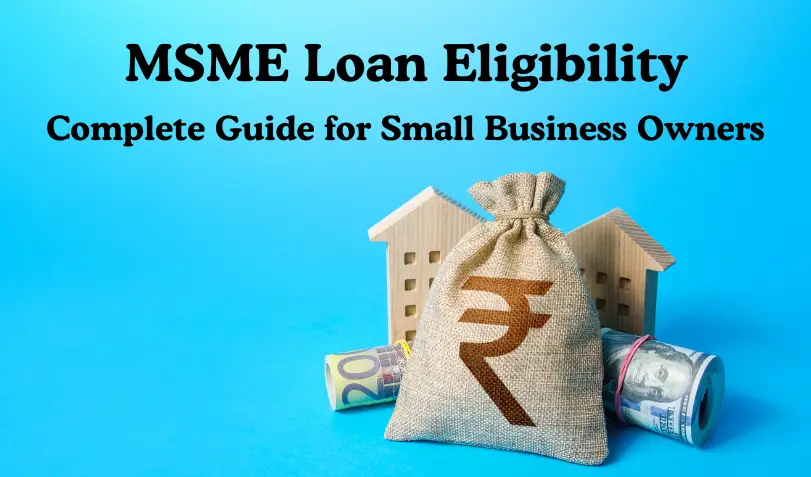MSME Loan Eligibility: Complete Guide for Small Business Owners

Running a Micro, Small, or Medium Enterprise (MSME) in India is not an easy journey. Entrepreneurs constantly need working capital, funds for expansion, or support to handle day-to-day expenses. This is where an MSME loan becomes a reliable financial tool. But before applying, every business owner must understand one important factor — MSME loan eligibility.
In this blog, we will explain MSME loan eligibility in detail, covering all the requirements, benefits, documents, and tips to improve your chances of getting approved. If you are searching for practical guidance, this article on msmeloaninindia.co.in is designed just for you.
What is MSME Loan Eligibility?
In simple terms, MSME loan eligibility refers to the set of conditions that a business must meet to qualify for financial assistance from banks or NBFCs. These conditions ensure that loans are given only to genuine, registered, and operational small businesses.
Eligibility criteria usually depend on:
- Type of business (manufacturing, trading, or service-based)
- Years of operation
- Annual turnover
- Credit score and repayment history
- Documentation and registration
Understanding these parameters helps you prepare in advance and avoid rejection.
Importance of Knowing MSME Loan Eligibility
Many entrepreneurs directly apply for a loan without checking the MSME loan eligibility requirements. As a result, their applications often get rejected. By knowing the criteria:
- You save time and effort.
- You can prepare the right documents.
- You improve your approval chances.
- You can apply for higher loan amounts with confidence.
So, whether you are applying through a private lender, government scheme, or financial institution, always go through the MSME loan eligibility checklist first.
Key MSME Loan Eligibility Criteria
Different banks and NBFCs may have slightly different requirements, but some standard conditions are common across India. Let’s break them down:
1. Business Type
- Micro, Small, and Medium Enterprises (as per MSME Act).
- Proprietorship, Partnership firms, Private Limited Companies, and LLPs are eligible.
- Startups registered under Udyam can also apply.
2. Age of the Business
- Most lenders require a minimum of 1–2 years of business operations.
- However, some government schemes may allow new entrepreneurs as well.
3. Turnover Requirement
- Annual turnover should meet the threshold defined for MSMEs.
- Usually, a minimum turnover of ₹12–15 lakhs is preferred by lenders.
4. Applicant’s Age
- The applicant should be between 21 to 65 years.
5. Credit Score
- A healthy CIBIL score (650 or above) improves loan approval chances.
- Past repayment records also matter.
6. Registration
- Udyam Registration Certificate is a key proof of being an MSME.
- Other registrations like GST and PAN are also required.
These are the most critical factors under MSME loan eligibility.
Documents Required to Prove MSME Loan Eligibility
To support your loan application, you need to submit specific documents. These include:
- Identity Proof: Aadhaar, PAN, or Passport
- Business Proof: Udyam Registration Certificate, GST certificate, shop act license, etc.
- Financial Documents: Bank statements, ITR filings, balance sheets
- Ownership Proof: Rent agreement or property papers
- Other Supporting Documents: Partnership deed, MOA/ AOA for companies
Proper documentation speeds up the approval process and strengthens your MSME loan eligibility.
Benefits of Meeting MSME Loan Eligibility
When your business fulfills the MSME loan eligibility criteria, you can enjoy:
- Quick access to funds
- Low-interest rates under government schemes
- Longer repayment tenure
- No collateral in some cases
- Tax benefits on interest paid
This makes loans not just a financial backup, but also a growth opportunity.
Common Reasons for Rejection Despite MSME Loan Eligibility
Sometimes businesses meet the MSME loan eligibility norms but still face rejection. Common reasons include:
- Poor credit history
- Incomplete documents
- Over-leveraged loans (already existing debt)
- Incorrect information in application
To avoid this, always double-check your paperwork and maintain financial discipline.
How to Improve MSME Loan Eligibility
If your business currently doesn’t qualify, you can still take steps to enhance your chances. Here’s how:
- Build a strong credit history – Pay EMIs and bills on time.
- Maintain healthy cash flow – Show consistent income in bank statements.
- Get Udyam Registration – It’s mandatory for MSME recognition.
- Keep financial records updated – Proper ITRs and balance sheets help.
- Reduce existing debt – Lenders prefer businesses with low liability.
By following these steps, you can boost your MSME loan eligibility and qualify for higher loan amounts.
Government Schemes Based on MSME Loan Eligibility
India offers several government schemes that provide financial support to MSMEs. These include:
- CGTMSE (Credit Guarantee Fund Trust for Micro and Small Enterprises)
- PMEGP (Prime Minister Employment Generation Programme)
- MUDRA Loan under Pradhan Mantri Mudra Yojana
- Stand-Up India Scheme
Each of these schemes has specific MSME loan eligibility conditions. For example, CGTMSE allows collateral-free loans up to ₹2 crores for eligible businesses.
Why Choose msmeloaninindia.co.in for Guidance?
If you are confused about your MSME loan eligibility, platforms like msmeloaninindia.co.in can help. The website provides easy-to-understand guides, eligibility calculators, and expert advice to improve your chances of loan approval.
Instead of navigating the complex process alone, businesses can rely on this platform for clarity and support.
Final Thoughts
Getting an MSME loan is not just about applying — it’s about understanding MSME loan eligibility thoroughly. If your business meets the criteria, approval becomes quick and smooth. If not, you can take corrective steps to qualify in the future.
Whether you’re a startup or a well-established enterprise, knowing the rules of MSME loan eligibility can make a huge difference in your financial journey. For reliable information and assistance, you can always explore resources at msmeloaninindia.co.in.
Frequently Asked Questions :
Q1. What is MSME loan eligibility in India?
MSME loan eligibility in India refers to the basic criteria that micro, small, and medium enterprises must fulfill to qualify for financial support from banks or NBFCs.
Q2. Who can apply for an MSME loan?
Any business registered as micro, small, or medium enterprise under the MSMED Act, including proprietorships, partnerships, private limited companies, and LLPs, can apply.
Q3. What are the documents required for MSME loan eligibility?
Key documents include Aadhaar card, PAN card, business registration proof, bank statements, GST returns, and financial statements.
Q4. Is CIBIL score important for MSME loan eligibility?
Yes, a good CIBIL score (usually 700 or above) increases the chances of loan approval and helps secure lower interest rates.
Q5. Can startups apply for MSME loans?
Yes, startups that are registered as MSMEs and meet the eligibility criteria can apply for MSME loans to fund their business growth.
Q6. What is the maximum loan amount under MSME loan eligibility?
Depending on the lender, MSMEs can get loans ranging from ₹50,000 to ₹5 crores, based on business turnover, credit history, and repayment capacity.
Q7. Do I need collateral for MSME loan eligibility?
Most MSME loans are unsecured, meaning no collateral is required. However, for larger amounts, lenders may ask for security.
Q8. How can I check my MSME loan eligibility online?
You can check MSME loan eligibility online by visiting lender websites or portals like msmeloaninindia.co.in, where instant eligibility checks are available.
Contact Us
1204 GD – ITL Building, B- 08,
Netaji Subhash Place, Delhi-110034
Email: ceo@nkbkredit.com
Phone: +91 7503211000,
+91 9654981031
Important Links
Disclaimer
This website functions as a MSME-specific advisory channel supporting businesses seeking structured funding solutions. Advisory, documentation, and lender coordination services are provided by NKB Kredit Solutions Pvt. Ltd., a registered Indian company offering business finance advisory services.
